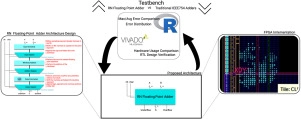A new floating-point adder FPGA-based implementation using RN-coding of numbers

A well-known problem in the computer science area is related to numerical data representation, which directly affects adder circuits' design and a reason to have different formats: IEEE Std. 754, Half-Unit-Biased (HUB), and Round-to-Nearest (RN). RN has an advantage that rounding to nearest is equivalent to a word truncation. It avoids double rounding errors and intermediate rounding steps with an exact conversion between formats, making it applicable to general problems. However, there is a lack of research on the hardware implementation of the RN representation. In this work, we propose hardware architectures for binary and floating-point adders, analyzing for the latter its performance in terms of error and resource consumption in FPGAs. To accomplish this, we have developed a one-bit RN-based adder that allows modular designs, considering an efficient signal propagation to obtain new architectures for both binary and floating-point single-precision adders. The results open new perspectives for further applications.
Publisher URL: https://www.sciencedirect.com/science/article/pii/S004579062030793X
DOI: 10.1016/j.compeleceng.2020.106947
Keeping up-to-date with research can feel impossible, with papers being published faster than you'll ever be able to read them. That's where Researcher comes in: we're simplifying discovery and making important discussions happen. With over 19,000 sources, including peer-reviewed journals, preprints, blogs, universities, podcasts and Live events across 10 research areas, you'll never miss what's important to you. It's like social media, but better. Oh, and we should mention - it's free.
Researcher displays publicly available abstracts and doesn’t host any full article content. If the content is open access, we will direct clicks from the abstracts to the publisher website and display the PDF copy on our platform. Clicks to view the full text will be directed to the publisher website, where only users with subscriptions or access through their institution are able to view the full article.


